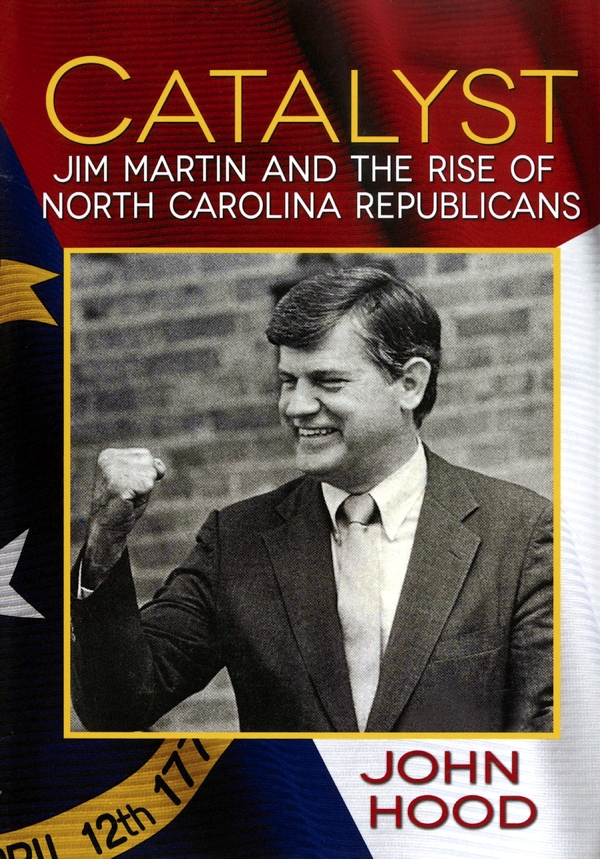‘The past is prologue,’ says Jim Martin
Published 12:00 am Sunday, December 13, 2015

- John Hood's book describes Jim Martin's rise from chemistry professor to N.C. governor and his impact on state politics.
A chemist at heart, former Gov. Jim Martin likes being thought of as a catalyst — a substance that accelerates a reaction without itself being changed.
That’s been Martin’s role throughout his political life, from Mecklenburg County commissioner to member of Congress to governor of the Tarheel state from 1985 to 1993.
Lest anyone think today’s leaders of the General Assembly invented Republican conservatism in North Carolina, John Hood reminds everyone of Martin’s pivotal role with a new book, “Catalyst: Jim Martin and the Rise of North Carolina Republicans” (John F. Blair, Publisher).
Martin and Hood signed copies of the book Thursday evening at the Literary Bookpost in downtown Salisbury. Relaxing at a small table in the heart of the store, they greeted old friends and chatted with visitors.
Hood, whose columns run in the Post and dozens of other papers across the state, is chairman of the John Locke Foundation, a conservative think tank, and now president of the John William Pope Foundation.
You have to know Hood’s conservative credentials to understand that Martin was not entirely sure how the writer might depict him in the book.
“I didn’t have editorial control,” Martin said. “I wondered if he might try to paint me as a flaming moderate.”
Martin may not be a pure moderate, but he’s no flaming right-winger, either. And therein lies the value of Hood’s book, a history lesson in governing to get things done.
The pivotal moment, described in the book’s prologue, was a 1985 gathering at Blackberry Farm in Tennessee. Martin and several other Republican governors put together what Hood calls a Second Southern Strategy. Democrats had dominated state and local politics in the South for a very long time; Martin and his allies set about breaking that grip.
The GOP had won Southern support in presidential races, Hood writes, “by leveraging the conservative views of rural and small-town whites on crime, civil right, religion and foreign policy.” (Deliberately leaving out blacks, I would add.)
Martin and his cohorts aimed to attract Democratic voters to the GOP on the state and local level by “offering an appealing alternative to Democratic governance,” Hood writes. They adopted Ronald Reagan’s optimistic conservatism.
That was three decades ago. Now the state has a Republican governor and a Republican-controlled legislature. More votes were cast for Democrats in the state’s congressional races, but Republican-drawn districts divided those votes so effectively that the state also has a majority Republican congressional delegation.
“Some people say we went too far,” Martin said Thursday evening. But North Carolina has not been the only state to see the vote go this way, he pointed out. What was once the Democrats’ solid South became the Republicans’ solid South, Martin says.
So what comes next? Has gerrymandering locked in Republican control for the foreseeable future?
Not necessarily, Martin and Hood said. Districts drift. Pendulums swing. Hood pointed out that Republicans rose to power in 2010 in districts drawn up by Democrats. Then Republicans drew new districts that favor the GOP.
Democrats don’t have much chance of gaining seats in 2016, Hood said. By 2020, though, the population may have changed enough to give more Democrats a shot at victory.
What impact might Donald Trump have on this process? Martin and Hood were not warm toward the Donald.
Trump could bump the pendulum, Martin said — though the governor emphasized more than once that Trump’s polling percentage is just 35 percent of the 30 percent of voters who are Republican — therefore, 10 percent.
Hood jumped in. “I don’t think he’s going to be the nominee,” he said.
If people come to believe Trump can win the White House, they’ll nominate him and find out something quite different come fall, Hood said.
It was time to close shop. Martin signed my copy of “Catalyst” with a line from Shakespeare: “The past is merely prologue.”
In North Carolina, the Democrat-dominated past was the prologue to the Republican-dominated present. What next?
Maybe it’s time for a Third Southern Strategy.
Elizabeth Cook is editor of the Salisbury Post.

